






but what you are looking for is somewhere else. Please select from the known universe:
Home | Calendar | Store | Webmail | TCS Forums| Contact Us | Search

Setting up Open Transport and Open Transport PPP for TCS Explorer Service is quite easy, compared to using older software in Mac OS or other platforms. This document will guide you step-by-step through the following tasks.
Note: Open Transport PPP is known as "Remote Access" in Mac OS 8.5 and above.
![]() Prerequisite: Open Transport 1.1.1 or greater, Open Transport PPP 1.0 or greater, and the settings documents you can download here.
Prerequisite: Open Transport 1.1.1 or greater, Open Transport PPP 1.0 or greater, and the settings documents you can download here.
You must have first installed Open Transport PPP 1.0 or later (hereafter known as "OT/PPP"), and restarted your Macintosh. Refer to the attached instructions for help identifying, obtaining and installing Open Transport and OT/PPP.
Inside your Control Panels folder under the Apple menu is a control panel named Modem. Open that control panel.

Select your modem type in the Modem pop-up menu. If your specific model of modem is not listed, try to select an equivalent model, or the same brand.
If your modem is not connected via a cable to the Modem Port, select the appropriate port from the Connect Via pop-up menu.
Pull down Quit from the File menu. Confirm your changes by pressing Save when requested.

That's it! Open Transport now knows how to coax the best performance and reliability out of your modem.
Inside your Control Panels folder is a control panel named TCP/IP. Open that control panel.
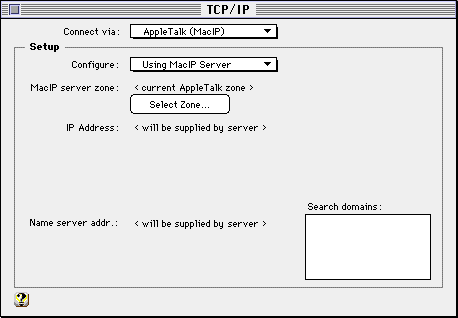
Inside the TCP/IP control panel, pull down Configurations... from the File menu.
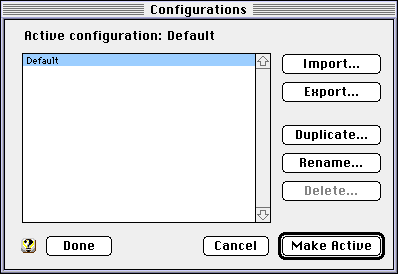
Press the Import... button. Locate and select the preconfigured TCS Explorer TCP/IP Settings file which is provided with these instructions. This fully describes the TCS Explorer Service environment to Open Transport's TCP/IP software.
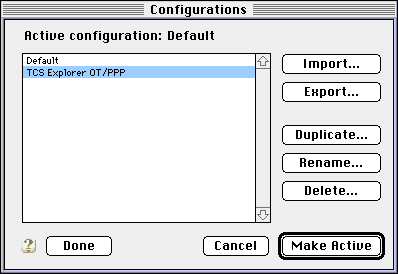
Click to highlight TCS Explorer OT/PPP in the list, and press the Make Active button. When asked for confirmation, click OK. This activates the appropriate TCP/IP settings for use with TCS Explorer Service.
Note: If you subscribe to multiple Internet service providers, or if your Mac is physically connected to a local area network, you may have several TCP/IP configurations specified in the TCP/IP control panel. For instance, if you subscribe to the America Online service, you may have an "AOL Link" configuration in addition to your new "TCS Explorer OT/PPP" configuration. You can switch between these settings whenever you are offline. You do not need to restart, however you should not have any Internet applications running while you do this.
Pull down Quit from the File menu. That's it! You've told the TCP/IP control panel everything it needs to know about the networking environment of TCS Explorer Service.
Inside your Control Panels folder under the Apple menu is a control panel named PPP. Open that control panel.
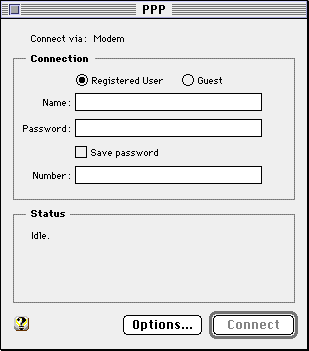
While the PPP control panel is open, pull down Configurations... from the File menu.
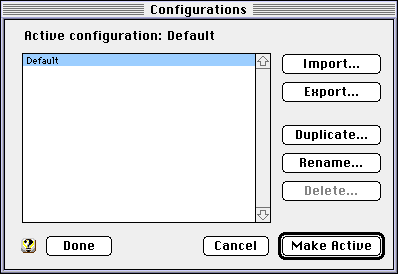
Press the Import... button. Locate and select the preconfigured TCS Explorer PPP Settings file which is provided with these instructions. This tells OT/PPP how to connect and communicate with TCS Explorer Service.

Click to highlight TCS Explorer in the list, and press the Make Active button. When asked for confirmation of these changes, click OK.
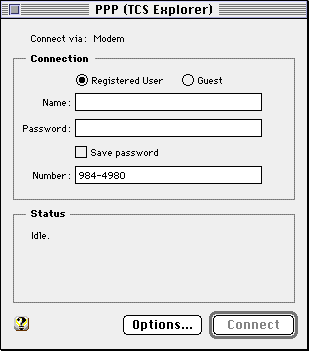
In the top pane of the PPP window:
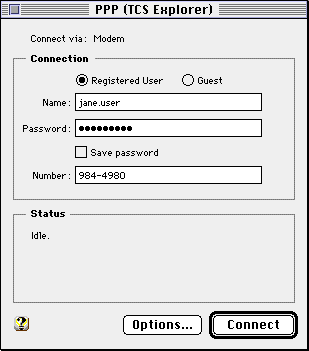
That's it! The PPP control panel now knows everything it needs in order to communicate with TCS Explorer Service.
You're now ready to connect to the Internet, through TCS Explorer Service. Press the Connect button. Watch the progress in the Status panel. If all goes well, the Status will appear as follows, and you'll be connected to the Internet!
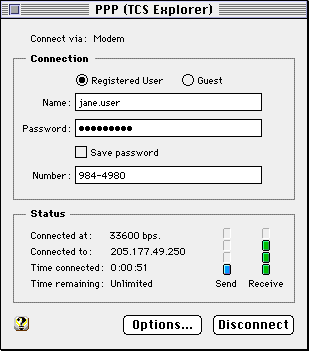
If you connected, congratulations! Close the PPP control panel by pulling down Quit from the File menu. Then launch an Internet application such as Apple's Cyberdog or Netscape's Navigator and explore your way around. Be sure to visit Explorer Home periodically to stay in touch with the latest updates and features of TCS Explorer Service.
If you did not connect, first double-check the steps above, keeping track of any unexpected or mismatched prompts and warnings. Be sure to write down the exact text of any such warnings, in case you need to ask someone's help over the telephone or on the TCS.
The best place to ask for assistance with your TCS Explorer Service configuration is on the classic TCS bulletin board system, in the special support board on Conference 1, Board 30. For best results, be specific about the model of Mac or clone you have, the version of system software you're using, the brand of modem installed, and the names and versions of any other communications or networking software you have installed on your machine. This includes any fax software, as well as dial-up networking software.
When all else fails, there's always the telephone. Refer to the Hotline list in the center of your latest Washington Apple Pi Journal, where there's a specific category for "TCS Help". The Hotline, as with every service of Washington Apple Pi, is a fruit of the labors of many volunteers who offer their help for other members of the club. Please respect the wishes of these volunteers by calling only at the times listed, and only for the topics specified by a given Hotline volunteer.
Of course, if you've successfully connected to the Internet using these instructions, you too are an expert in connecting to TCS Explorer Service! Please give serious thought to volunteering your talents to the club, be that by answering Hotline calls, writing "real-world" articles for the Journal, distributing membership applications to stores near you, or helping stuff envelopes for renewal and other mailings. To be put in touch with a volunteer coordinator, please visit the TCS's Conference 1, Board 18, or call the business office at (301) 984-0300. We'd love to hear from you!